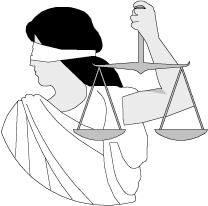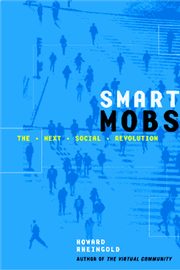| Friday, January 31, 2003 |
| Personal responsibility versus law |
 Most of our societies are based on the "rule of law". Which works out to be about the opposite of how I think things should be. The rule of law is essentially that some rules are written down and agreed upon, and everybody will be equally forced to follow the rules. That is usually presented as a reasonable alternative to everybody just doing whatever they feel like, which would be perceived as a chaotic anarchy. Most of our societies are based on the "rule of law". Which works out to be about the opposite of how I think things should be. The rule of law is essentially that some rules are written down and agreed upon, and everybody will be equally forced to follow the rules. That is usually presented as a reasonable alternative to everybody just doing whatever they feel like, which would be perceived as a chaotic anarchy.
The problem is that lawmakers don't know how to write down principles of social behavior, or they're really just trying to enforce their own moral biases on everybody, so they end up writing huge volumes of detailed rules about how people are supposed to behave or not behave. And invariably they leave a lot open to interpretation, and they forget to think about many contexts where those behaviors aren't necessarily what works, and they end up with a self-contradictory mess. Which makes it a good business to be a lawyer, and those people who can afford more lawyers than others would tend to be more able to get what they want. Now, the people who actually enforce laws will tend to hide behind the word of the law, and will tend to have the attitude that they're just carrying out the law, or they're just following orders. In other words, they're not responsible. That is by design, by the division of the powers of government. But it is also what usually turns governments into such unfeeling monsters. Lawmakers can sit in confortable chairs and make rules, without having to soil their hands with involvement in the actual circumstances where those laws might or might not work. Police forces will carry out the laws, using force, potentially lethal force. Nobody's really responsible. Different people make the laws than who interpret them than who carry them out. There's a lot to say about all of this. My first point, however, is that personal responsibility would be a better fundamental principle than would institutionalized irresponsibility. In other words, if the police officer stops you for speeding, or for taking too long zipping up your pants in the public bathroom, he'd better be able to defend why that was the right thing to do right then. Not whether the law told him so or not, but why it served a useful purpose right then and there. Judges who condemn people need to be thoroughly exposed to that which they condemn them to. I.e. attend their executions, or visit them in prison. And politicians should have to face all of that, to experience on their own skin the consequences of their laws. That would be a good first step. What really ought to change is the inherent insanity in making volumes of laws that are just 'good ideas' but that really don't work in all circumstances in real life. A law says that certain things ALWAYS must be a certain way, and that this will be enforced. Somebody makes a law that says 'nobody's allowed to drive faster than 55mph'. Might sound like a good idea, as it sounds more safe, and it would save gasoline. But then later on somebody thinks 'what about the police or firetrucks?' and maybe they change the law to have an exception for police or firetrucks, or maybe everybody implicitly agrees that it of course wouldn't apply to them. Why not? Any law that has any kind of exceptions is a bad law. What about if I have a medical emergency and need to get to the hospital? What if I drive 75mph and nobody else is around for miles? What if there is some urgent need that you didn't think of spelling out in the law? Its the law that is bad. What it is really trying to accomplish is that people are safe while driving, but it tries to do it by applying the same numbers to everybody. What would rather be needed would be a guideline, a general principle, and some people to carry it out who actually would be responsible for their own choices. There should be nothing to hide behind. [ Opinions | 2003-01-31 15:23 | 2 comments | PermaLink ] More > |
| Barlow on DRM |
 Steve Gillmor interviews John Perry Barlow on his opinions of DRM (digital rights management), intellectual property law, and copyright extension. John is always worth listening to, and he has important things to say. Steve Gillmor interviews John Perry Barlow on his opinions of DRM (digital rights management), intellectual property law, and copyright extension. John is always worth listening to, and he has important things to say."I think that anybody who cares about the future of technology -- anybody who cares about the future, period -- ought to be awfully concerned about this. But people who work in technology have been agnostic on the subject so far. They need to recognize that they're going to be faced with a fairly stark choice, which is a gradual concentration around certain trusted platforms that cannot be broken out of and are filled with black boxes that you can't code around and can't see the inside of.And as an answer to the question of why it is so difficult to present the case that fair use needs to be protected he says: "It's a difficult proposition because the content industry has done a marvelously good job of getting people to believe that there's no difference between a song and a horse, whereas for me, if somebody's singing my song, I think that's great. They haven't stolen anything from me. If somebody rides off on my horse, I don't have anything and that is theft. Otherwise intelligent people think that there's no difference between stealing my horse and stealing my song. [The content industry] has also managed to create the simplistic and basically fallacious notion that unless we strengthen dramatically the existing copyright [regime], that artists don't get paid anymore. First of all, artists aren't getting paid much now. Second, making the institutions that are robbing them blind even stronger is not going to assure [their] getting paid more. And it's going to make it very difficult for us to create economic [and] business models that would create a more interactive relationship with the audience, which would be good for us economically and good for us creatively." [ Knowledge | 2003-01-31 16:05 | 2 comments | PermaLink ] More > |
| Global Frequency and Smart Mobs |
 Technology Review compares science fiction visions with the concepts Howard Rheingold talks about in his book "Smart Mobs" and the website with the same name. 'Global Frequency' is a new comic book series by Warren Ellis: Technology Review compares science fiction visions with the concepts Howard Rheingold talks about in his book "Smart Mobs" and the website with the same name. 'Global Frequency' is a new comic book series by Warren Ellis:"Set in the near future, Global Frequency depicts a multiracial, multinational organization of ordinary people who contribute their services on an ad hoc basis. As Ellis explains, "You could be sitting there watching the news and suddenly hear an unusual cell phone tone, and within moments you might see your neighbor leaving the house in a hurry, wearing a jacket or a shirt with the distinctive Global Frequency symbol...or, hell, your girlfriend might answer the phone...and promise to explain later...Anyone could be on the Global Frequency, and you'd never know until they got the call." Ellis's story responds to significant shifts in the media environment — in particular the increasing role of mobile phones and wireless computing - but also to speculations about their social and political impact."And then listen to how Rheingold defines Smart Mobs: "Smart mobs consist of people who are able to act in concert even if they don't know each other. The people who make up smart mobs cooperate in ways never before possible because they carry devices that possess both communication and computing capabilities.... Groups of people using these tools will gain new forms of social power."Like we're all part of the underground. We're able to act in concert, but our organization is invisible, and there's nobody in charge who can be bought. [ Culture | 2003-01-31 23:59 | 0 comments | PermaLink ] |